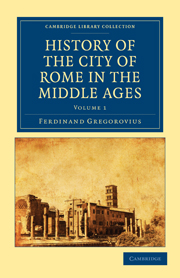Book contents
- Frontmatter
- TRANSLATOR'S PREFACE
- PREFACE TO THE SECOND EDITION
- Contents
- BIOGRAPHICAL NOTICE OF FERDINAND GREGOROVIUS
- BOOK I FROM THE BEGINNING OF THE FIFTH CENTURY TO THE FALL OF THE WESTERN EMPIRE IN 476
- BOOK II FROM THE BEGINNING OF THE REIGN OF ODOACER TO THE ESTABLISHMENT OF THE EXARCHATE IN RAVENNA, 568
- CHAPTER I
- CHAPTER II
- CHAPTER III
- CHAPTER IV
- CHAPTER V
- CHAPTER VI
- CHAPTER VII
- INDEX
CHAPTER II
Published online by Cambridge University Press: 05 July 2011
- Frontmatter
- TRANSLATOR'S PREFACE
- PREFACE TO THE SECOND EDITION
- Contents
- BIOGRAPHICAL NOTICE OF FERDINAND GREGOROVIUS
- BOOK I FROM THE BEGINNING OF THE FIFTH CENTURY TO THE FALL OF THE WESTERN EMPIRE IN 476
- BOOK II FROM THE BEGINNING OF THE REIGN OF ODOACER TO THE ESTABLISHMENT OF THE EXARCHATE IN RAVENNA, 568
- CHAPTER I
- CHAPTER II
- CHAPTER III
- CHAPTER IV
- CHAPTER V
- CHAPTER VI
- CHAPTER VII
- INDEX
Summary
THEODORIC'S ATTITUDE TOWARDS THE ROMANS—HIS ARRIVAL IN ROME, 500—HIS SPEECH TO THE PEOPLE—THE ABBOT FULGENTIUS—THE RESCRIPTS IN CASSIODORUS—CONDITION OF THE PUBLIC BUILDINGS—THEODORIC'S CARE FOR THEIR PRESERVATION—CLOACAE—AQUEDUCTS—THE THEATRE OF POMPEY—THE PALACE OF THE PINCH—PALACE OF THE CAESARS—FORUM OF TRAJAN—THE CAPITOL
Theodoric maintains the traditionary forms of government
Theodoric, a foreigner like Odoacer, had already acquired the respect if not the affection of the Romans; his justice, and yet more his acquiescence, in all existing forms of government had endeared him to the people. Long usage, moreover, had accustomed Italy to German rule and taught Italians to regard it as an inevitable necessity.
The Gothic King did not meddle with any of the existing institutions of the Roman Republic, but rather sought to flatter the people by awarding them a pompous recognition. The political and civil character of Roman administration remained unaltered; the conditions both of public and private life as entirely Roman as in the times of Theodosius or Honorius. Theodoric himself adopted the gentile name of Flavius. The Senate he treated with peculiar distinction, although the illustrious Fathers no longer retained any share in the administration of the State, and were now only regarded as the centre of such dignities as entitled their occupants to a seat in the Curia. The Petronii, Probi, Fausti and Paulini, all members of the great family of the Anicii, were those who still held the highest offices in the State.
- Type
- Chapter
- Information
- History of the City of Rome in the Middle Ages , pp. 287 - 337Publisher: Cambridge University PressPrint publication year: 2010First published in: 1900

